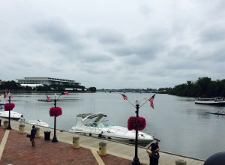Posts Tagged ‘Congress’
Unity on the Potomac?
The Potomac is smooth as a mirror today. The wind occasionally dusts its surface. On lamp posts by the river, American flags catch a light breeze and flutter under an overcast sky. Fall is stirring in the air though joggers still run in shorts and tee shirts and students pace to the boathouse for afternoon rowing practice.

A mile form here Washington is recovering from two major State visits in four days—first Pope Francis and literally on his papal heels, Chinese President Xi Jinping.
But here on the river with a view of Memorial Bridge and the Kennedy Center, of the traffic cruising on Rock Creek Parkway and airplanes taking off from National airport, it is unusually quiet for a Friday afternoon. Couples stroll by. A mother with a pram stops and looks out on the gray-brown water. The city is perhaps letting out its collective breath. There have been no attacks, no disasters.
Washington has feted and listened—been told to unify for greatness by the Pope and then looked for common cause with the Chinese leader who has limited shared values and certainly not an agenda of individual freedom.
It is always an existential question whether America—“one nation under God with liberty and justice for all”—can live its ideals and live in the world.
From a political point of view, the right to dissent and the forums to express disunity are fundamental and the very evidence of a nation breathing, of a democracy working. No one is arrested or imprisoned for their disagreements. We have the freedom to be in gridlock though surely there is a better way to demonstrate freedom. The question ahead as political campaigns heat up is whether we can breathe and disagree and at the same time govern and guide.
The spiritual call for unity is one each citizen must find in his own sanctuary, not in the halls of Congress.
As I’m writing, I hear sirens whining in the distance growing louder and louder, and in front of me on this terrace overlooking the river, a great crane appears and a wall is literally lifted out of the walkway. I’m told these walls, which lay buried most of the time, were installed after the last great flood wiped out the waterfront. The waitress returns and tells me they are now raised on any threat of a flood. Down river floods have occurred and may be moving our way.

China at 60–Fate of Liu Xiaobo?
On its 60th Anniversary, China is Still Crushing Freedom
Congress should pass Resolution 151 to speak out on behalf of arrested dissident Liu Xiaobo.
From The Christian Science Monitor
WASHINGTON – The People’s Republic of China celebrated its 60th anniversary today with massive military parades, fireworks, and concerts throughout the country. In mid-November, President Obama will make his first presidential visit to Beijing, marking the 30th anniversary of Chinese-US relations with an agenda likely to include the environment, security, and the global economy.
In the time between these milestones, the fate of an individual Chinese citizen hangs in the balance and may well foreshadow future relations with China. Liu Xiaobo, one of China’s leading writers, intellectuals, and dissidents, is expected to come to trial and be sentenced after the anniversary celebrations and before the president’s visit.
That’s why Congress must act quickly. The proposed Resolution 151 calls for Mr. Liu’s release and urges China to “begin making strides toward true representative democracy.” The resolution notes Liu’s own words: “The most fundamental principles of democracy are that the people are sovereign, and that the people select their own government.”
Resolution 151 should be passed with dispatch before Liu’s trial and sentencing so that it might signal to Beijing how much America cares about the lack of freedom in China. Liu was arrested last December and charged this June with “inciting subversion of state power” for his role as one of the principal drafters of Charter 08, a document that set out a democratic vision for China. Charter 08 was originally signed by more than 300 leading writers, engineers, teachers, workers, farmers – even former public servants and Communist Party officials. It was subsequently signed by more than 10,000 Chinese citizens. The document was circulated widely on the Internet, though it is now blocked in China.
Patterned after Charter 77, which demanded basic civil and political rights in Czechoslovakia when it was under Soviet domination, Charter 08 calls for nonviolent democratic change in China and for a government that recognizes that freedom “is at the core of universal human values,” and human rights are inherent, “not bestowed by a state.”
In a recent visit to Capitol Hill, writers from the Independent Chinese PEN Center, where Liu is a former president, as well as American writers, urged members of Congress to accelerate the passage of Resolution 151. The Chinese writers, who were in touch with Liu up until the day he was arrested, say that they believe a resolution by the US Congress would have a beneficial effect and help mitigate the severity of the sentence, which could be as much as 15 years. However, the resolution needs to pass before his trial and sentencing; otherwise it will come too late.
There is wide bipartisan support for the resolution, but questions arise:
Can this essentially symbolic gesture actually help Liu? The emphatic answer from his Chinese colleagues is yes. Even if he’s not released, Chinese authorities, sensing pressure from China’s chief trading partner, might give a shorter sentence to one of its leading thinkers and writers.
Will this gesture complicate US policy toward China? The question instead should be: How can the US have a policy with China that ignores the imprisonment of major democratic activists?
The release of Liu Xiaobo would be an enlightened act that the Chinese government could take in the wake of its 60th anniversary, signaling to the world that it is not afraid of ideas.